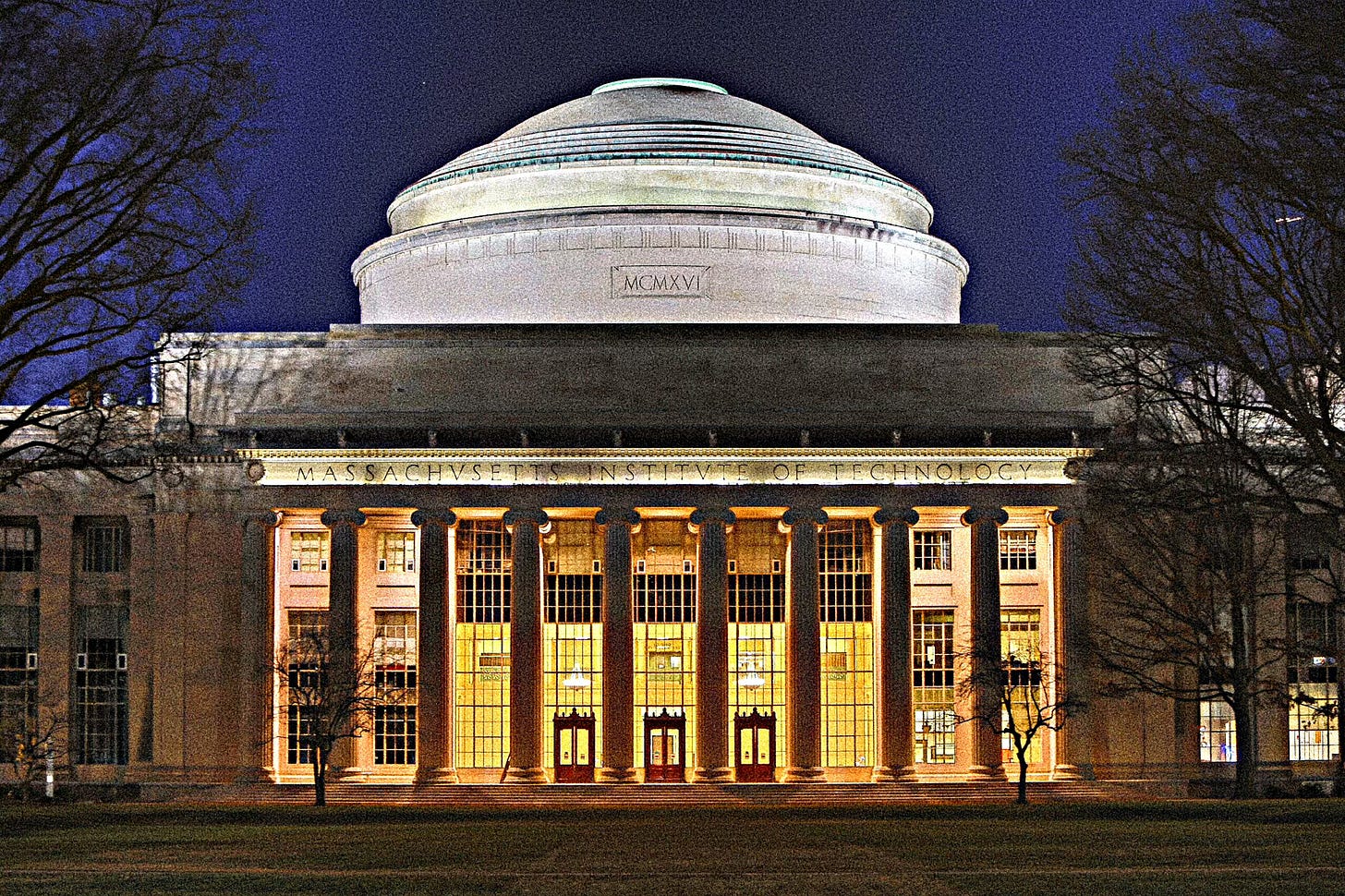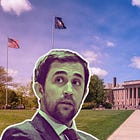Trump's Compact Wants Universities to Give Up Their 'God'-Given Rights
Even if they wanted to, the Constitution bars them from doing so, making his proposal doubly unconstitutional
On Friday, the Massachusetts Institute of Technology (MIT) formally rejected the Trump administration’s proffer to nine universities of a supposed “Compact for Excellence.” The proposed deal doesn’t seem much more popular at other institutions, which have given it little if any affirmative response so far; at a meeting of University of Virginia faculty, 97% rejected the idea. My Cato colleague, Neal McCluskey, has already outlined the basics of the scheme, and I emphatically agree with his conclusion that universities that agree to it would be “selling their souls.”
I write here to expand on the compact’s many lawless and unconstitutional provisions, which begin but do not end with First Amendment violations. As University of Chicago First Amendment specialist Genevieve Lakier writes at Divided Argument, the compact “flagrantly disregards” the well-established unconstitutional conditions doctrine, “which holds that the government may not condition access to government benefits on the recipient’s agreement to waive their constitutional rights, including the rights protected by the First Amendment.”
Among the ways the compact tramples on First Amendment rights:
It demands governance reforms aimed at “transforming or abolishing institutional units that … punish, belittle, and … spark violence against conservative ideas.” The notion that no project or center at a university may henceforth “belittle” conservative ideas is blatantly restrictive of speech, and the pointed refusal to offer similar cosseting and shelter to ideas on other points on the political spectrum—no federal repercussions are promised should classical-liberal, pacifist, or leftist ideas be belittled—screams aloud that the intent is to do away with even the pretense of what First Amendment lawyers call content neutrality.
It charges universities with actively “seeking out … a broad spectrum of viewpoints … within every field, department, school, and teaching unit,” whether or not they find such viewpoints valid or helpful to their educational mission, and it leaves to government discretion to fill in the blanks as to what qualifies as “broad.”
Universities would be obliged to suppress speech expressing “support for entities designated by the U.S. government as terrorist organizations,” which appears mostly directed at Palestine support but also would reach expressions of support for whatever the government decides to designate as Antifa, a loose and poorly defined group of movements that Trump just declared to be a terrorist organization. As Trump designates more groups as such in the future, the permitted range of advocacy on campus will shrink further. It is important to note that federal courts have found a wide range of advocacy in favor of such groups, and even advocacy favoring violence in principle, to be protected under the First Amendment so long as it falls short of the carefully limited exceptions to the First Amendment’s coverage, of which the most relevant here, incitement, requires elements such as a likelihood that the speech will result in imminent, not just eventual, lawless action.
First Amendment expert Eugene Volokh reaches similar conclusions and also identifies several other likely violations. For example, in a number of cases, courts have ruled that even where the federal government can properly direct that none of the money it bestows be spent to promote an ideological viewpoint, private organizations remain entitled under the First Amendment to express such a viewpoint with money they have raised elsewhere—a right the compact would deny them.
Volokh believes the Trump administration is also on shaky ground when it demands that universities “pledge to … screen out [foreign] students who demonstrate hostility to the United States, its allies, or its values.” He believes that the federal government could lawfully exercise its own immigration powers to apply such standards in screening the award of student visas but cannot properly conscript universities into being part of such an effort, especially employing screens that flagrantly reject content neutrality (better be respectful toward U.S. “allies” and “values,” however someone in the Trump administration defines those this week) and which may clash with the university’s own values.
In July, I analyzed a blueprint for The UnPopulist that was circulating for a very similar deal, in which universities would surrender their independence as a condition of receiving federal loans, grants, tax benefits, and the like. (It’s not clear whether that plan figures in the genealogy of this one.) I spent much of my energy arguing that the worst things of all about the plan were its manner of proposed adoption (unilateral presidential decree) and enforcement (guillotine-like total immediate funding cutoffs for violations, even minor ones, with no visible due process or judicial review in the administration’s assessment of violations).
Almost amazingly, this new plan manages to be even worse in some ways. It contemplates not only what I call the push-button guillotine—someone in Washington declares a violation, and all the student loans and research grants suddenly disappear—but also proposes to make them retroactive, with give-backs of money already advanced in a year and even a truly crazy demand that colleges refund on demand private donations given during the look-back period. The obvious point is to keep university presidents totally dependent on the day-to-day whim of the federal overseers.
Writing at Balkinization, UCLA law professor Joseph Fishkin has some strong observations about the proposed enforcement process and the whole mode of governance it represents. It is, he argues, emblematic of:
this administration’s overall approach to law. That approach is to try to sideline law itself—its regularity, predictability, transparency, and treating likes alike—and replace the law with “the deal.” By “the deal,” I do not mean what might come to mind to lawyers who read that phrase—a contract by which both sides are equally bound. Instead I mean a “deal” in the special Donald Trump sense: an agreement you and I sign that binds you to do what I want, grants me new leverage over you to demand more in the future, and does very little to bind me. That is what this compact is.
It should be an easy decision for college presidents not to stick their institution’s neck into this retroactive push-button guillotine.
An earlier version of this piece was first published in the Cato Institute’s Cato at Liberty blog.
Follow us on Bluesky, Threads, YouTube, TikTok, Facebook, Instagram, and X.
We welcome your reactions and replies. Please adhere to our comments policy.









MIT probably realizes (as Trump does not) that the lion's share of their research funding is more important to the government and won't be withdrawn under any circumstances.
This is a perfect example of how authoritarians grow government. In addition to the current bureaucracy required to dispense the funding to colleges and universities they will need a bureaucracy to police compliance: more reports, more inspections and more resources to investigate complaints.
At its heart it is a thinly veiled affirmative action program for conservative academic professionals and ideas. Actually there should be a place for conservative academics of excellence and programs centered on conservative ideas but it should also be subject to the same market demand as other studies.
Considering issues around tuition it should also not be forgotten that, at least at state institutions, legislatures have slashed financial support by nearly 80% since the 1970s and tuition has raised in that time by much more than the rate of inflation.
Much of the agenda Trump is putting forward however is transforming colleges and universities into glorified trade schools. The obsession with post graduate incomes is absurd and has no real correlation to the quality of the education received and the purpose for which that education was obtained.
These academics do NOT have a God given right to our TAX dollars. We should just take it away and then they can do what that they want. But don’t count on it the leasure class that Is academia lives off those tax dollars.